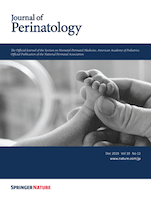
Journal of Perinatology
Scope & Guideline
Transforming perinatal care with impactful insights and discoveries.
Introduction
Aims and Scopes
- Neonatal Health and Development:
Research focused on the physiological and developmental aspects of neonates, including growth trajectories, neurodevelopmental outcomes, and the impact of various medical interventions. - Maternal Health and Pregnancy Complications:
Studies addressing maternal conditions and their implications for neonatal outcomes, including diabetes, hypertension, and substance use during pregnancy. - Quality Improvement Initiatives:
Implementation and evaluation of quality improvement projects aimed at enhancing care delivery in neonatal intensive care units (NICUs), focusing on processes such as infection control, feeding protocols, and family-centered care. - Clinical Interventions and Therapeutics:
Investigations into various therapeutic approaches for neonatal conditions, including surfactant therapy, pharmacological treatments, and innovative medical technologies. - Social Determinants of Health:
Exploration of how socio-economic factors, race, and healthcare access influence neonatal health outcomes and disparities in care. - Ethics and Policy in Neonatology:
Discussion on ethical dilemmas, healthcare policies, and advocacy efforts related to the care of neonates and their families.
Trending and Emerging
- Telemedicine and Remote Care:
The rise of telemedicine in neonatal care is a notable trend, especially in response to the COVID-19 pandemic, highlighting the importance of remote monitoring and consultation for neonatal patients. - Artificial Intelligence and Machine Learning Applications:
Increasing interest in the application of AI and machine learning to improve diagnostic accuracy, treatment protocols, and healthcare efficiencies in neonatology. - Family-Centered Care Approaches:
Growing emphasis on integrating family perspectives and involvement in neonatal care, fostering better outcomes for both infants and their families. - Impact of Social Determinants on Health:
A heightened focus on understanding how social factors influence neonatal health outcomes, addressing equity and disparities in care delivery. - Quality Improvement and Standardization Initiatives:
An expanding body of research dedicated to optimizing clinical practices through quality improvement initiatives, ensuring consistency and enhancing patient safety in NICUs.
Declining or Waning
- Traditional Neonatal Resuscitation Techniques:
Research on conventional resuscitation practices may be waning as newer, evidence-based techniques gain traction, leading to a decrease in studies focused on older methods. - Longitudinal Studies of Historical Practices:
The emphasis on retrospective studies examining outdated clinical practices is diminishing, as the field shifts towards more innovative, forward-thinking research methodologies. - Single-Center Studies:
There is a decreasing trend in the publication of findings from single-center studies, as multicenter collaborations and larger cohort studies become the standard for robust evidence. - Basic Science Research in Neonatology:
While foundational research remains important, there is a noticeable decline in basic science studies as clinical applicability and translational research take precedence.
Similar Journals
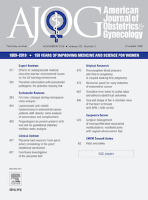
AMERICAN JOURNAL OF OBSTETRICS AND GYNECOLOGY
Transforming Knowledge into Practice for Women's HealthThe American Journal of Obstetrics and Gynecology, established in 1920 and published by Mosby-Elsevier, stands as a premier platform for the dissemination of critical research in the field of obstetrics and gynecology. With an impressive Scopus rank of #2 out of 209 journals in its category, placing it in the 99th percentile, this journal is recognized for its significant contributions to clinical practice and academia, as evidenced by its Q1 quartile status for 2023. Aimed at researchers, healthcare professionals, and students, the journal features a wide array of articles addressing contemporary issues, innovative research findings, and evolving practices in women's health and reproductive medicine. Although it does not currently offer open access options, it remains a vital resource for those seeking in-depth analysis and insights within this crucial medical specialty. By bridging the gap between research and clinical implementation, the American Journal of Obstetrics and Gynecology continues to play a pivotal role in shaping the future of obstetric and gynecologic care.
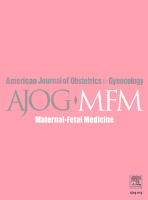
American Journal of Obstetrics & Gynecology MFM
Elevating clinical practices with high-impact research insights.The American Journal of Obstetrics & Gynecology MFM, published by Elsevier, stands at the forefront of research in the fields of obstetrics and gynecology, serving as an authoritative source for groundbreaking studies and reviews. With an impressive impact factor reflected in its elite Q1 rankings in both Medicine (miscellaneous) and Obstetrics and Gynecology for 2023, this journal not only showcases high-quality research but also plays a pivotal role in shaping clinical practices and guidelines. This esteemed publication, available in both print and online formats, provides open access to a wealth of knowledge, encouraging global collaboration and advancement in maternal-fetal medicine. The journal's focus extends from 2019 to 2024, covering emerging trends and innovations that address the most pressing health challenges faced by women and their children. As the journal continues to enhance its scholarly contributions, it invites researchers, educators, and practitioners to engage with its cutting-edge content that is vital for advancing the science and practice of obstetrics and gynecology.
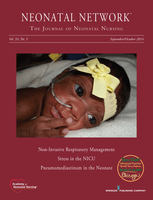
Neonatal Network
Exploring the complexities of neonatal health.Neonatal Network, published by Springer Publishing Co, is a respected journal in the field of Critical Care and Intensive Care Medicine, focusing on the complexities of neonatal health and development. With an ISSN of 0730-0832 and an E-ISSN of 1539-2880, this journal has been a vital resource for practitioners, researchers, and students since its inception in 1985. Covering a pivotal scope that encompasses Critical Care Nursing, Pediatrics, and Perinatology, it aims to enhance the understanding and treatment of newborns in critical conditions. Although categorized in the Q3 and Q4 quartiles by Scopus for 2023, its contributions remain significant, fostering a platform where innovative research and clinical wisdom converge for the benefit of neonatal care. As a non-open access journal, it provides insightful articles that are pivotal for enhancing neonatal practices and outcomes, ensuring its relevance as a distinguished academic outlet through 2024. The journal's rich history and focus on interdisciplinary collaboration make it an essential resource for those committed to advancing neonatal health.
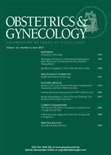
OBSTETRICS AND GYNECOLOGY
Elevating Obstetrics and Gynecology to New HeightsObstetrics and Gynecology is a leading peer-reviewed journal published by Lippincott Williams & Wilkins, focusing on the comprehensive fields of obstetrics and gynecology. With an impressive impact factor and a prestigious ranking of Q1 in Obstetrics and Gynecology as of 2023, this journal is recognized for its significant contributions, placing it in the top tier among its peers (6th out of 209 in Scopus' Medicine category). Established in 1953, it continues to publish high-quality research and clinical studies that advance the field. Although it is not open access, this journal is essential for practitioners, researchers, and academics who seek to stay updated on the latest advancements in women's health. Its commitment to disseminating vital information makes it an invaluable resource for those dedicated to improving patient outcomes and enhancing the understanding of gynecological and obstetric practices. The journal is based in the United States, at Two Commerce Sq, 2001 Market St, Philadelphia, PA 19103, and continues to lead discussions and innovations in women's healthcare.
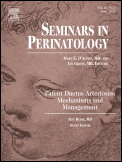
SEMINARS IN PERINATOLOGY
Delivering high-impact insights for clinicians and researchers alike.SEMINARS IN PERINATOLOGY is a premier academic journal dedicated to the field of perinatology, published by W B SAUNDERS CO-ELSEVIER INC. With an impressive impact within the Q1 quartile ranking in both Obstetrics and Gynecology and Pediatrics, it serves as a vital resource for advancing knowledge and research in maternal-fetal medicine and neonatal care. The journal is committed to publishing high-quality, peer-reviewed articles that encompass a wide range of topics relevant to clinicians, researchers, and students in the field. Spanning over four decades, since its inception in 1977 and continuing through 2024, SEMINARS IN PERINATOLOGY aims to foster dialogue and disseminate innovative insights that contribute to improving outcomes in perinatal health. As evidenced by its strong Scopus rankings—50th in Pediatrics and 40th in Obstetrics—this journal is essential for anyone seeking to deepen their understanding of these critical areas of healthcare.
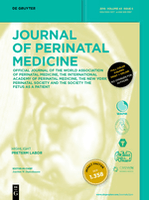
JOURNAL OF PERINATAL MEDICINE
Elevating research standards for global maternal care.JOURNAL OF PERINATAL MEDICINE is a reputable peer-reviewed journal published by Walter de Gruyter GmbH since 1973, with a steadfast commitment to advancing research in the fields of Obstetrics, Gynecology, Pediatrics, and Perinatology. With an impressive impact factor reflected by its Q2 quartile rankings in both Obstetrics and Gynecology and Pediatrics, this journal serves as a vital resource for professionals and researchers dedicated to improving maternal and child health outcomes. The journal's robust Scopus rankings, where it stands at 76th out of 330 in Pediatrics and 64th out of 209 in Obstetrics, further underscores its significant contribution to the academic community. Featuring cutting-edge research, clinical studies, and reviews, the JOURNAL OF PERINATAL MEDICINE strives to foster a deeper understanding of the complexities surrounding perinatal health while promoting interdisciplinary collaboration. Published in Germany, the journal remains accessible to a global audience, ensuring that essential findings are disseminated to drive innovation and best practices in the field.
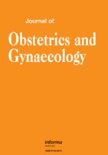
JOURNAL OF OBSTETRICS AND GYNAECOLOGY
Transforming Clinical Practices with Groundbreaking InsightsWelcome to the Journal of Obstetrics and Gynaecology, a premier academic publication dedicated to advancing the field of obstetrics and gynecology. Published by Taylor & Francis Inc, this esteemed journal has been a vital resource since its inception in 1945, with a convergence period from 1980 to 2024. Now embracing the Open Access model since 2023, it aims to disseminate research more broadly, facilitating knowledge transfer among researchers, healthcare professionals, and students alike. With a current impact factor that situates it within the Q3 category of Obstetrics and Gynecology, the journal has garnered recognition as a significant contributor to the medical community, ranked #109 out of 209 in Scopus. Based in the United Kingdom, the journal focuses on publishing high-quality research that addresses contemporary issues in women's health, aiming to significantly enhance clinical practices and patient outcomes. Whether you are a seasoned researcher or a student venturing into the field, the Journal of Obstetrics and Gynaecology offers a wealth of knowledge, fostering innovation and excellence within this critical discipline.
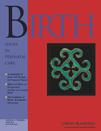
BIRTH-ISSUES IN PERINATAL CARE
Advancing Perinatal Insights for a Healthier TomorrowBIRTH-ISSUES IN PERINATAL CARE, published by Wiley, stands as a premier journal in the field of Obstetrics and Gynecology, with a remarkable impact factor and categorized in the prestigious Q1 quartile for 2023. This journal, identifiable by its ISSN 0730-7659 and E-ISSN 1523-536X, has been at the forefront of disseminating groundbreaking research and clinical findings from its inception in 1973 through to its anticipated convergence in 2024. With a strong ranking of #70 out of 209 in Scopus Medicine category, it represents the 66th percentile in its field, underscoring its significance in advancing perinatal care practices. Although not an open access journal, it provides vital insights and evidence-based information that empower researchers, healthcare professionals, and students alike, making vital contributions to the welfare of mothers and infants. The journal’s scope encompasses a wide range of topics critical to perinatal health, ensuring that it remains an essential resource for anyone engaged in this dynamic area of study.

MATERNAL AND CHILD HEALTH JOURNAL
Empowering communities with knowledge for better health.The Maternal and Child Health Journal, published by Springer/Plenum Publishers, stands as a leading platform for the dissemination of rigorous research in the fields of maternal and child health. With an impressive impact reflected in its 2023 Q1 ranking in Pediatrics, Perinatology and Child Health and strong placements in related categories such as Epidemiology, Obstetrics and Gynecology, and Public Health, this journal serves as a crucial resource for researchers and practitioners eager to stay at the forefront of advancements and debates in the field. The journal, issued with both ISSN 1092-7875 and E-ISSN 1573-6628, supports a broad range of accessible research that aims to improve maternal and child health outcomes across diverse populations, while its convergence from 1997 to 2024 demonstrates its long-standing commitment to this critical area of study. With an emphasis on evidence-based findings and innovative approaches, the Maternal and Child Health Journal is an essential read for those devoted to enhancing health policies and practices that affect mothers and children worldwide.
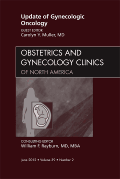
OBSTETRICS AND GYNECOLOGY CLINICS OF NORTH AMERICA
Exploring the Frontiers of Obstetrics and GynecologyObstetrics and Gynecology Clinics of North America, published by W B Saunders Co-Elsevier Inc., is a leading academic journal in the field of obstetrics and gynecology, boasting a prestigious Q1 ranking in its category as of 2023. Serving as a vital resource for clinicians, researchers, and students, the journal offers in-depth reviews and cutting-edge research that span the spectrum of women's health issues. With an impact factor reflective of its high citation rates and influence across the field, the journal encourages a comprehensive understanding of both common and complex challenges in obstetrics and gynecology. The journal has been converging high-quality research since 1987, always striving to push the boundaries of knowledge and clinical practice. Its commitment to excellence makes it an essential publication for those dedicated to advancing women's health care.